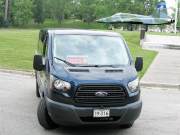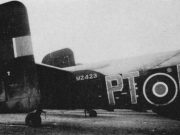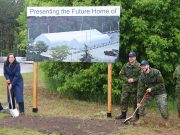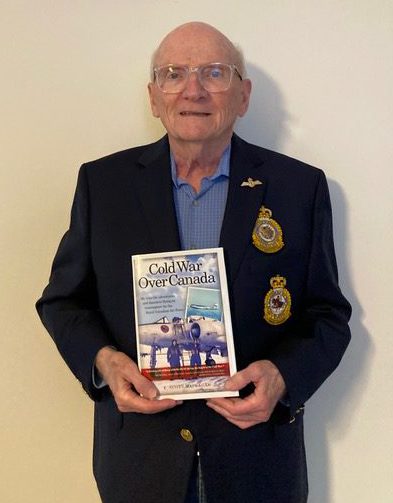Veteran recalls his experience as a navigator during the Cold War in new book
In August 1955, Scott Maclagan received a call inviting him to attend the officer selection course in London, Ont. making him one of 30 to successfully complete the 250-cadet course, marking the beginning of his military career.
Maclagan’s path to the military began with a childhood fascination with aviation. Growing up in Toronto, he was exposed to aviation through newsreels, wartime events and interactions with neighbors who served as Spitfire pilots during World War II. This interest eventually led him to enlist in the Canadian Armed Forces.
“I had a keen interest in aviation flying during my childhood. My father would take me to Barker field on Dufferin Street and there would be private planes flying there,” Maclagan said. “And then he had friends that worked in Downsview.”
Throughout his time in the military, Maclagan faced numerous challenges, including the loss of colleagues and friends. The inherent risks of military service, from high-altitude flights to hazardous emergency landings, made each mission a potentially life-threatening experience. Scott described the trauma of witnessing accidents and losing fellow servicemen, emphasizing the sacrifices made in the line of duty.

“[The most challenging part of my training] was seeing your friends die in front of your eyes… I saw more death during my training in Winnipeg,” Maclagan said. “I had a fear of heights back then. It was facing the unknown every time you went up. You didn’t know what was going to happen. Our poor wives didn’t know whether we’d be home that night, that week, that month or you know… ever.”
On May 18, 1956, Maclagan recalls waiting for the long weekend when four C-45 jet aircrafts came into land in Winnipeg. Suddenly, a fifth aircraft appeared 300 yards in front of Maclagan, sitting in the co-pilot’s seat.
“They went down right in front of our eyes and 10 people were killed,” he said.
According to Maclagan, death was an unfortunate, but common part of flying aircrafts, with even the most routine protocols and well-maintained aircrafts being subject to malfunction.
However, the risk of flying was celebrated as it often resulted in saving lives. Maclagan recalls a time in which he helped an American Boeing KC-97 arial tanker which lost electric power and radio in a thunderstorm overtop Northern Ontario.
“By hand signal we found out their problem and then guided them to an emergency landing in Michigan,” Maclagan said.

One morning in North Bay, as the first alert crew on duty that day, Maclagan and his team were told that there was a civilian aircraft in distress over Val d’or, Quebec. A man and woman were in the aircraft with the pilot operating the aircraft having only had 35 hours of flight time.
“We guided them into an emergency landing on an emergency strip, really,” Macalgan said. “It was a runway in the middle of nowhere in Quebec! At that time, we were down 500 pounds of fuel and the only option for us was to land there ourselves or bail out. [My pilot] Dave [Strachan] decided to land, so we did.”
When Maclagan’s military career came to an end in 1962, he faced the transition to civilian life. He adapted to various jobs, including roles in the tax department and the insurance industry. He noted that the military’s training provided a strong foundation, enabling him to excel in the private sector.
Maclagan’s experience highlights the importance of recognizing the valuable skills and discipline acquired during military service. However, he also touched upon the challenge of adapting to the politics of the private sector, a shift many veterans face.

“My pilot [Dave Strachan] became very embittered, as told by his children to me,” Maclagan said. “They explained what he had gone through after we broke up as a flying partnership and the lack of recognition for what he’d done in saving three other aircraft. It just really ate at him.”
Maclagan emphasized the need for better communication between the military and civilian employers. This communication could help employers recognize the skills veterans bring to the workforce and improve their transition process.
“It was a shared experience at the squadron because we all were facing the same thing,” Maclagan said. “We worked hard it was a very tense and difficult life that you had to adapt to.”
Remembrance Day holds immense significance to Maclagan, due to the many friends and colleagues he lost during his service. The day serves as a crucial reminder of the sacrifices made by the military, honoring those who lost their lives and those who continue to serve their country.
Maclagan expressed his desire that the public strive to be appreciative and understanding of the sacrifices made by military personnel. Veterans have served their country with dedication and have often faced physical and emotional challenges. Recognizing these sacrifices is essential to fostering a deeper appreciation of the CAF.
To read more about Maclagan’s experiences defending Canada’s air space from potential Soviet attacks during the Cold War, click here to access his new book titled ‘Cold War Over Canada’.
By: Caleb Hooper











